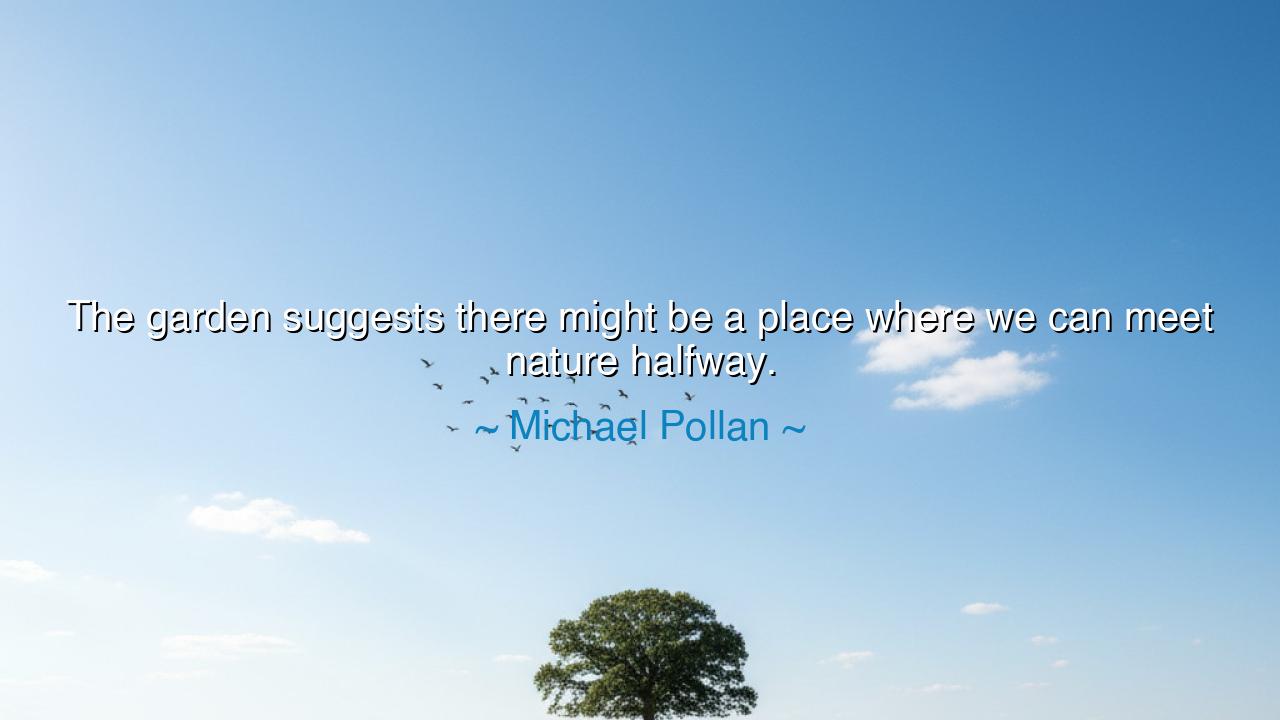
The garden suggests there might be a place where we can meet






Hear now the wise and tender words of Michael Pollan, a philosopher of the earth and chronicler of our bond with the living world: “The garden suggests there might be a place where we can meet nature halfway.” In this sentence lies not only a reflection on soil and seed, but a revelation about the proper place of humankind within creation. For too long, man has stood apart — conquering, consuming, commanding — as though the earth were his servant. Yet Pollan reminds us that the garden is not a battlefield, but a meeting ground. It is the sacred borderland where the wildness of nature and the will of humanity can coexist in balance and mutual respect.
Born of both the plough and the forest, the garden is humanity’s oldest covenant with the natural world. Long before the age of steel and machine, our ancestors learned to coax life from the soil, not by domination alone, but by partnership. They turned the chaos of the wild into a place of order and meaning — yet never fully banished the wildness within it. In the garden, weeds still return, storms still come, and life still follows its own law. Thus, even in the most cultivated plot, nature retains her voice. The wise gardener listens to that voice and works with it, not against it. Pollan’s words recall this forgotten truth — that the world does not belong to us, but we belong to it, and our joy lies in finding harmony, not supremacy.
To “meet nature halfway” is to understand the limits of control. The gardener may plant, water, and prune, but it is the sun that ripens, the rain that nourishes, and the mystery of life itself that brings the seed to bloom. Every gardener, sooner or later, learns humility. They see their designs undone by frost, their labors undone by drought or pestilence. Yet in those moments, they glimpse something greater than defeat — they see that nature is not their enemy, but their teacher. She invites cooperation, patience, and wonder. The garden is thus a conversation — half human intention, half divine spontaneity — where beauty arises not from mastery, but from relationship.
So it was in the ancient gardens of Babylon, counted among the wonders of the world. There, amidst brick terraces and flowing waters, man and nature were woven together in a vision of living harmony. The builders did not seek to erase the desert that surrounded them; instead, they invited water into it, coaxing fertility from the arid land. Their work stood as a symbol — that even in hardship, the human spirit and the natural world can thrive together. But when balance was lost, when greed and pride overtook reverence, those gardens fell, as all empires do. The lesson endures: civilization blooms only as long as it tends the soil beneath it.
Pollan’s wisdom also speaks to our modern age, when humankind has strayed far from the rhythms of earth. We have paved the rivers, caged the winds, and buried the stars in our lights — yet still we hunger for something we cannot name. That hunger is for connection. The garden, in its quiet way, offers the remedy. It calls us back to the slow miracle of growth, the humility of tending, the gratitude of harvest. It reminds us that we are not lords, but stewards; not separate, but kin to the worm, the bee, and the tree. When we meet nature halfway, we rediscover what we have lost — the peace that comes from belonging.
To meet nature halfway is not to return to wilderness alone, nor to abandon cultivation. It is to cultivate wisely — to build homes that breathe with the earth, to eat from soil that we have honored, to live with awareness of the cycles that sustain us. The true gardener is one who works not to dominate the land, but to heal it. Such harmony begins not in fields, but in the heart. When a person learns to tend their garden with love rather than control, they begin to tend the world in the same way — gently, gratefully, and with care.
And so, dear listener, the lesson of Pollan’s words is this: the garden is not merely a patch of earth — it is a mirror of the soul. How we treat it reflects how we live within creation. To meet nature halfway is to meet life itself — humbly, reverently, and with wonder. Plant something. Nurture it. Watch it grow and change, and let it teach you that growth requires both giving and surrender. For when you stand in your garden — hands in the soil, eyes upon the green — you stand at the very threshold of harmony, where man and earth once again speak the same language.
Thus, may every garden, no matter how small, be a promise — a sign that peace between humanity and nature is not lost, but waiting. For as Michael Pollan reminds us, the garden is more than a place of beauty; it is the sacred space where the human hand and the divine earth shake in friendship once more.






AAdministratorAdministrator
Welcome, honored guests. Please leave a comment, we will respond soon